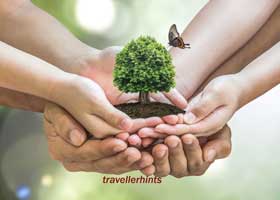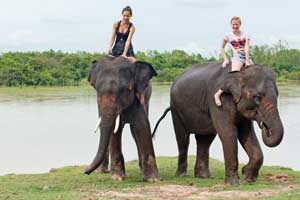When living the life of a professional traveler, it is common to find ourselves in situations where professional traveler ethics come into questions.
From the specific laws within the region in which you are traveling to the colloquial dos and don’ts will be different depending on which country you visit, and where you are within that country.
First, and probably most important to keep in mind, is that something that is legal in one place in the world can be illegal in another, even if you are just across the border!
Second, simple ethics like common courtesy and standards of politeness, like phrases that are common in your country, but offensive in another, are important to be aware of when you are living the life of a professional traveler.

Whether or not potential unethical situations are dangerous and could land you in jail, or if they could simply cause you to appear impolite in your new country, awareness of these ethics is important to keep you safe and happy on your next trip abroad.
For these reasons, the following article is an introduction to some of the potentially non-ethical situations you should avoid when travelling.

Professional Traveler Ethics – 1: Breaking the country laws
It is absolutely important to know what is legal in the country you will be visiting. Laws can be simple, like whether you should drive on the left or right side of the street.
They can also be complicated, like immigration laws that prevent you from staying in a country for more than a certain number of months without specific paperwork.
Professional travelers should always make sure to plan their trips according to the laws present in the country they intend to visit. Information about a country’s laws can be found on its government website, easily found by searching the internet for the embassy website for the country you wish to visit.
Immigration laws are an especially important set of laws to understand if you wish to stay in a country for an extended period of time. For example, a US citizen wishing to visit France on a travel visa can only do so for 3 months.
Please Note : Over staying, Illegal money exchanged and working without working visa!
After that time, barring marrying a local to apply for a spousal visa, you would need to find a job and apply for a work visa, or leave for another destination.
Immigration laws are strict, especially now in the United States under the new presidency’s immigration ban/initiatives.
Professional traveler ethics state that you must do your best not to break any laws in the country you wish to travel to, and that means doing your research to make sure that you are educated on that country’s laws and regulations.

Professional traveler ethics – 2: Illegal drugs trade
The trading of illegal drugs is something you should absolutely not get involved in when you travel based on professional traveler ethics. In recent years recreational and medicinal drugs like marijuana have become legal in many places in the world.
Since 2014, many states in the United States have legalized the retail sale and purchase of marijuana and in these states you can walk up to a counter, select a type of weed and take it home with you if you are over the legal age–just like visiting a grocery store!
In some other countries, partaking in minimal amounts of marijuana and certain other drugs like mushrooms and even harder drugs like LSD, Meth and Cocaine is legal.
Switzerland, the Czech Republic and Portugal are great examples of places that have taken a progressive approach to drugs by making many of them legal to use or possess in specified quantities.
But even if you wish to partake in drugs and the party scene in a new country, the illegal trafficking of drugs into or out of that country is not a good idea, as trading drugs is still a criminal offense in most of the world.
It is important, then to research what drugs are legal and illegal in the country you wish to visit, so that if you did want to bring some with you, you won’t be stopped at customs and get into a lot of unnecessary trouble.

Professional Traveler Ethics- 3: Illegal prostitution & Paedophile actives in Asia, USA, Middle East and Eastern Europe!
Asia and Eastern Europe are known for their lax enforcement of laws against prostitution. This means that in many places such as Cambodia, the Philippines, Indonesia and the Netherlands with its famous red light district, sex tourism is still a large part of the culture that attracts tourists to these regions.
This type of sex tourism is an absolute don’t in terms of professional traveler ethics. Yes, sex tourism can sound thrilling and if it is practiced by some you could reason that it would not be exactly unethical, but the very fact that it is illegal should be an automatic turn off.
Just because the country turns a blind eye to the practice, doesn’t mean it should be practiced at all, and if you are going to be an ethical traveller, you should not partake in illegal prostitution when travelling.
Professional Traveler Ethics: Paedophile
Paedophile activities are unfortunately prevalent, still in this day and age, across the globe as well as specifically in South East Asia.
Western Australia, being a wealthy region full of natural resources, is full of travellers able to travel easily across Asia. Unfortunately, it is also a hub for pedephilic rings, uncovered by Australian federal Police, State police and International law enforcement agency.
A few major cases include Child Sex Tours in Thailand, Asia’s paedophile rings, Pakistani paedophile ring in United Kingdom, global paedophile rings in Asian and former Soviet countries, and the Evil 8. These are all cases of paedophilic activity that have been uncovered around the world, and are ultimately disgusting examples of inhuman activity.
It’s safe to say that there isn’t much to say about paedephile activities while traveling more so than these are activities are immoral and should not be participated in Kids and females aren’t your property.
Stop trying to buy them as toys. If you want to hook up while traveling, go ahead. Professional travelers meet and get together all the time, but they are all adults and within the age limits of consent.

Professional Traveler Ethics- 4: Animal Sex Tourism and Trade ( Billion dollar sex trade)
The same goes for animal sex tourism, which is especially prevalent in Northern Europe. Beastiality is more common than you might think, and believe it or not, there are places you can go in the world where people will try to protect the rights of people who wish to love animals in this way.
Beastiality brothels in Germany and Denmark, South African sex with dogs, Columbian intercourse with Donkeys as practice before marriage are all legitimate, disgusting realities.
Even the US has its share of cases dealing with this type of behavior, and in Finland relations with animals is totally legal as long as no harm has come to the animal in the act.
And in many of the countries where it is illegal, it is still committed at an unbelievably common rate as the practice is not nearly as strictly regulated as other illegal activities.
This type of tourism is definitely not the reason you should be traveling abroad, and not something a professional traveller would take part in.
Furthermore, if you are travelling abroad to pick up an exotic pet, think again. This is a definite don’t in traveler ethics. The illegal trade of exotic animals is more heavily regulated in most countries, but it is still prevalent in many regions. Most animals sold illegally are done so because they are endangered, and thus more rare and valuable.
The very act of hunting exotic wildlife to sell is making endangered species more endangered by depleting their numbers in the wild, and putting them at risk of injury or death by being held in captivity.
The illegal trade of animals is not something you should be travelling to support, not only because it is illegal but because it is ultimately objectively unethical.

Professional Traveler Ethics – 4: Respect Culture and Customs
Now that we have covered all the strictly illegal activities, it is also important as a professional traveler to understand the importance of respecting the cultural customs of the region you are visiting.
For instance, the country you intend to visit may have different religious practices that shape their daily life, and if you do not adhere to the practice of these customs, you will be offending that religious culture.
One example of this would be the fact that women must cover their legs in Pakistan, as an observance of Islamic religious practices.
If a woman were to travel to this country and wear even shorts that were just above the knee, totally conservative in the America and many other countries, she would be seen as risque and offensively dressed. Another example is tipping your waiter.
In the US and many other parts of the world tipping for exceptional customer service at restaurants is common and even expected, but in some parts of the world like Vietnam, tipping does not happen.
To take it one step further, in Japan and South Korea it is even rude to tip your waiter after a meal. In these countries the servers believe they are being fairly compensated if they are indeed doing good work, so they do not need extra money and would take this offering as an insult to their service.

Professional Traveler Ethics – 5 Respect the ecosystem
One of the most important ethical aspects for professional travellers to consider when traveling is making sure they do not leave any waste behind in a place that they visit.
As we travel the world, we will inevitably leave some things behind–like that forgotten sweatshirt on the back of the seat on the bus, or that polaroid picture of you and that really cool couple from Spain that you met at that one bar, but one thing you should never leave behind is trash.
The best way to keep this planet of ours around to explore in the future is by leaving each place we visit as we found it when we arrived. This means picking up your trash after camping, staying on the trails instead of marching into the fragile overgrowth if you are out hiking, using Eco-friendly transportation like bikes or public transportation whenever possible, and overall picking up after yourself when you visit a new place.
Collecting trash and rubbish, and making sure it gets to the correct receptacle for waste in any country is the first and foremost job for the professional traveller to keep each country we visit clean.
It is also our job to keep the ecosystem as it was when we explore within its natural bounds, like going on nature hikes or exploratory journeys into the wild.
Especially in new and exotic places, when we step off the beaten path, we could be crushing endangered plants beneath our feet and not even know it.
For this reason, it is additionally helpful for professional travellers to research the potentially endangered species present in places we wish to visit before taking one of these types of trips.
By maintaining an awareness for the ethical treatment of the environment, travellers can keep what is most precious and fragile around us in the natural world stable and healthy, to enjoy for generations to come.

Professional Traveler Ethics – 6: Animal Close Encounters
Similar to the ethical treatment of the environment, one area of traveller ethics good to keep in mind when traveling is the ethical treatment of animals in the country you will be visiting. Animal close encounters can happen in many ways when travelling, either by interacting with them on nature hikes and walks or in established animal parks and venus with animal based entertainment.
When out hiking in a foreign country it is often a good idea to keep your distance from animals in case they are poisonous or aggressive, but a good way to make sure you are treating these wild creatures ethically is to go out with a guide.
Guides are available for hire in almost any place you visit, whether they be urban city tours or nature guides who have studied and understand the natural wildlife you want to know about.
This way, you will learn about new forms of wildlife, you’ll be advised about how to best keep from damaging those animals natural environment, and you will be aware of the precautions to take to remain safe as you explore the natural world.
When it comes to considering the ethics of viewing animals in activity, it is important to research whether or not the attractions you want to visit have ethical practices for animal treatment. Many exotic animals in countries like the India and Thailand are used to bring in tourism.
Elephant rides are a particularly popular example of this type of attraction, but what many professional travellers must be aware of is the fact that the raising and training of Elephants for this purpose is often full of unethical practices. Bullhooks are used to train the animals, using pain as a motivator and then as a way to control them in the riding process.
Furthermore, Elephants back are not meant to hold weight, so the act of riding the animal at all causes it discomfort and potentially long term health problems.
Whenever you are thinking about visiting a country to witness an attraction with trained animals like elephants, dolphins or sea lions, etc. keep in mind that if the training and treatment of these animals is unethical, it is not worth supporting.
 TravellerHints!
TravellerHints! 
Sam Navarathna says:
Like it